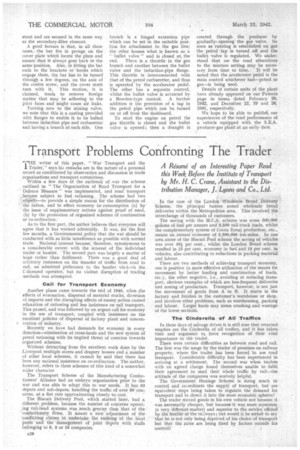Transport Problems Confronting The Trader
Page 30

If you've noticed an error in this article please click here to report it so we can fix it.
A Résumé of an Interesting Paper Read this Week Before the Institute of Transport by Mr. H. C. Crane, Assistant to the Distribution Manager, J.-Lyons and Co., Ltd.
'CBE writer of this paper. " War Transport and the 1 Trader," says his remarks are in the nature of a personal record as conditioned by observation and discussion in trade organizations and transport committees.
Within a few days of the outbreak of. war the scheme outlined in " The' Organization of Road Transport for a Defence Measure " was implemented, and road transport :became subject to fuel .rationing. .The scheme had two '.objerts—to provide a simple means for the distribution of the ration, and to effect economy in. consumption (a) by the issue of supplementary rations against proof of need, (b) by the promotion of organized schemes of combination or co-ordination:
As to the first part, the author believes that everyone will agree that it has worked admirably. It was, for the first few months, a Governmental .policy that the war should be conducted with as little interference as possible with normal trade. National interest became': therefore, synonymous to a considerable extent with the interest of the individual trader or haulier. The second part was largely a matter of hope rather than fulfilment. There was a good deal of arbitrary insistence, on the transfer of traffic from road to rail, an admitted preference to the haulier vis-à-vis the C-licensed operator, but no violent disruption of trading methods was attempted.
Call for Transport Economy Another phase came towards the end of 1940, when „the effects of evacuation, dispersal of material stocks, diversion of imports and the disrupting effects of enemy action caused relaxation of rationing and less insistence on rail transport. This passed, and was followed by an urgent call for economy in the use of transport, coupled with insistence on the excellent policies of dispersal of factory plant and concerttration of industry.
Recently we have had demands for economy in every direction—elimination of cross-hauls and the new system of petrol rationing with its implied threat of coercion towards organized schemes.
Without detracting from the excellent work done by the .Liverpool multiple stores and drapery houses and m number of other local schemes, it cannot be said that there has been any national insistence on co-ordination. The author, however, refers to three schemes of this kind of a somewhat wider character.
The Transport Scheme of the Manufacturing Confectioners' Alliance had an embryo organization prior to the war and was able to adapt this to war needs. It has 83 depots and sub-depots, handling the traffic of over 80 concerns, at a fiat rate approximating closely to cost.
The Biscuit. Delivery . Pool, which started later, had a different problem, because the number of concerns operating Tail-head systems was much, greater than that of the confectionery firms. It meant a nice adjustment of the .conflicting claims to .undertake the running of the local pools and the management of joint depots . with staffs belonging to 6, 8 or 10 companies.
4.28 In the case of the London Wholesale Bread Delivery' Scheme, the principal bakers zoned wholesale bread deliveries within the Metropolitan area This involved, the interchange of thousands of customers.
The saving with the M.C.A. scheme was some 500,000 gallons of fuel per annum and 3,500 rail-truck loads, whilst the complementary system of Cocoa Zonal production, etc., means an annual economy of 2,500,000 ton-miles. In one • area alone of the Biscuit Pool scheme the saving of vehicles was over 3.3-/per cent., whilst the London Bread scheme resulted in 25 per cent, economy in fuel and 18 per cent, in vehicles, also contributing to reductions in packing material and labour, There are two methods of achieving transport economy, one is positive (a more effective utilization of the means for movement by better loading and combination of loads, etc.), the other negative, i.e., avoiding or reducing transport, obvious examples of which are less-frequent deliveries and zoning of production. Transport, however, is not lust the movement of goods from A to B. It starts in the factory and finishes in the customer's. warehouse or shop, and involves other problems, such as warehousing, packing and labour. Larger loads may mean crushing and wastage of the lower section's.
The Cinderella of All Traffics In these days of salvage drives it is still true that returned empties are the Cinderella of all traffics, and it has takentime and argument to, force recognition of their vital th importance to e trader.
There were certain difficulties as between road and rail. The first was the usage by -the trader of premises on railway property, where the trader has been forced to use road transport. Considerable difficulty has 'been experienced in arriving at a settlement. The second was when traders with an agreed charge found themselves unable to fulfil their agreement to send their whole traffic by rail—the attitude of the companies was scarcely helpful.
The Government Haulage Scheme is doing much to control and co-ordinate the supply of transport, but are equivalent steps being taken to regulate the demand for transport and to direct it into the most economic spheres?
The trader moved goods in his own vehicle not because it was necessarily cheaper, but because it was more economic (a very different matter) and superior to the service offered' by the haulier or the railways ;-hut would it he unfair to say that he is not only being deprived, of his choice of transport but that the rates are being fixed by factors outside his control?




















































